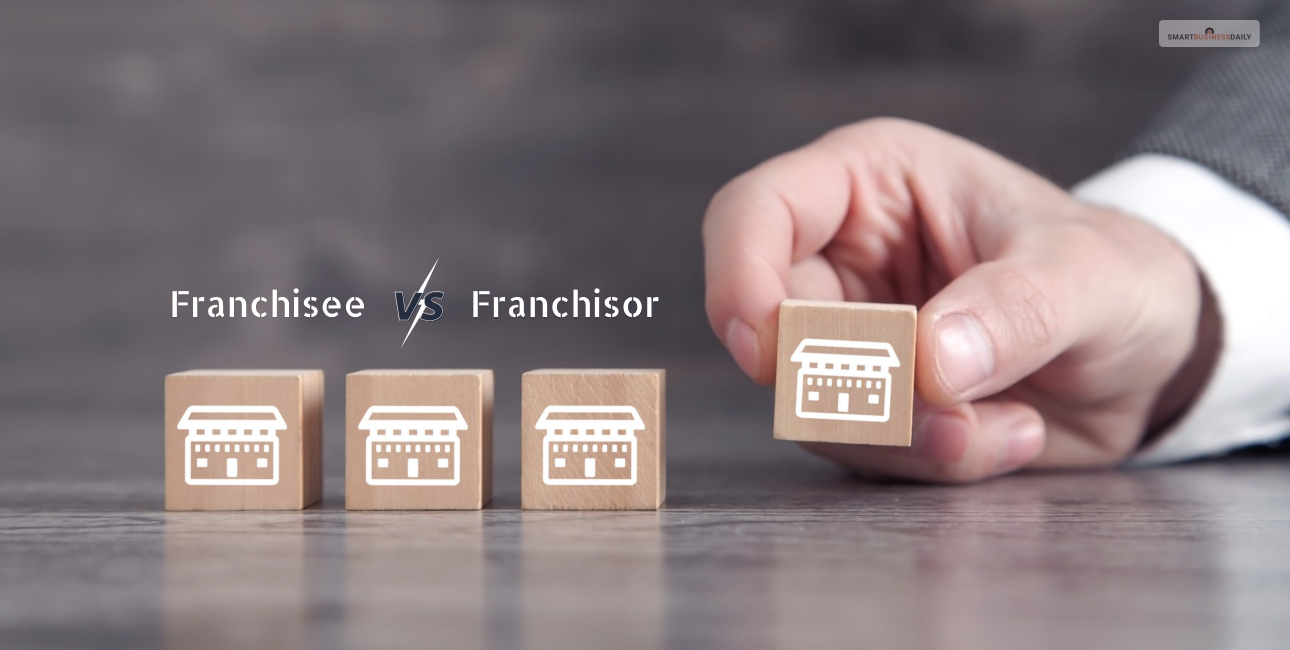Franchisee Vs Franchisor: What Are The Differences?
02 March 2024
10 Mins Read

toc impalement
Franchisee vs franchisor
What is the difference between franchisees and franchisors in the franchising business industry?
A study from July 2023 suggests that the USA has 750,000 franchising businesses established across different states. Also, 10.5% of all businesses in the USA are under a franchise business model.
So, if you are considering becoming a franchisee or a franchisor, here are a few basic things you must have a clear idea about.
Keep reading.
What is a Franchisee?

A franchisee is a person who buys a franchise business. In short, a franchisee is an individual who pays royalties, fees, and upfront costs to a franchisor ( a business owner) to run a business under their trademark. The franchisor’s trademark works as a label and a system that a franchisee can operate under.
Franchisees have a transactional relationship with the franchisors, enabling them to use the franchise system and the brand name. The fees include the upfront cost/fees and more.
The franchisees must follow and maintain the standards, rules, and systems set up by the franchisers. Also, they are in charge of the individual store locations, which includes running day-to-day operations, accounting, and employing people to the sales force.
A franchisee also has to communicate with the franchisor for the betterment of the location they operate. Their responsibility and accountability to the store make both the franchisors and the franchisees profitable. The working relationship between the franchisees and franchisors entails risks, rewards, profits, and so on.
Responsibilities of a Franchisee

Franchisee vs franchisor: The difference between the two main stakeholders of the franchise business entails most of the roles and responsibilities under it. First, you must understand the roles of each to find the difference between them. Following are the roles and responsibilities of a franchisee.
Upholding Brand Reputation
The topmost priority of a franchisee is to uphold the brand voice and the reputation of the franchisor. The reaction of a franchisee reflects upon the entire store location. If they show any inappropriate behavior or an outburst, it could lead the customers to have a negative impression of the entire chain. They can boycott the company locations or reject the store entirely. Hence, it is immensely important for franchisees to uphold the brand reputation.
Recruiting & Training Employees
The franchisee must be the acting lead of the store and take care of most of the operational duties. From uploading job postings to reviewing applications, interviews, and hiring, franchisees must do everything. However, franchisors can still provide help to the franchisees, such as training materials, guides, and strategies.
Maintaining Guidelines & Rules
Maintaining a franchisee business can be satisfying. The main reason is – you don’t have to build a business from scratch. The franchisor already has a successful and proven business model. A franchisee only must follow the business model and guidelines to open a location.
But, in return, a store owner has to abide by the rules and regulations of the franchisor. They have to believe in the vision the franchisor has set up. Plus, wearing their brand T-shirt and perform their inventory by following different protocols. Even their advertisement has to be through the signages of the competitor.
Finding & Leasing Buildings
A franchisee has to find a specific location for their store and pay a specific leasing fee for the lease. This is where the franchisor can help the franchisee with finding locations. In some cases, they can also help by providing necessary fixtures, store signage, furniture, etc.
Managing the Store
All the previous responsibilities led to this core responsibility, which is managing the storefront. Of course, some of the risks and burdens still fall under the franchisor’s supervision. But, the franchisee is responsible for turning the business into a success.
A franchisee has to manage the store on a day-to-day basis. They have to keep the store location operational and open, oversee the sales, and also close the store when the day breaks. So, it is not wrong to say that the franchisee is responsible for the success or the failure of a store location.
Paying Fees to Franchisor
A franchise business model requires a franchisee to agree to certain responsibilities. They can use the brand name, business model, and the operational system of an existing franchise.
But all these facilities come with a specific royalty fee that the franchisee needs to pay to the franchisor. In fact, they are bound by a strict contract that they need to keep paying the royalties even if the brand franchisor goes bankrupt.
Pros & Cons of a Franchisee

Here are some advantages franchisees faces and some difficulties they tackle –
Pros
Business Assistance
Franchisees as business owners receive lots of assistance from the franchisors. It includes plans, training, help with marketing, and more.
Brand Recognition
It is difficult to start a business from scratch and get it recognized. On the other hand, a business owner can own and run a franchise business and use the brand name for sustainable business growth.
Lower Failure Rate
Due to a pre-established business plan, it is easy to solve problems that a business owner might face while running a franchise. The owner already has plans to mitigate challenges and risks and reach the desired level of success.
Strong Customer Base
Thanks to strong brand recognition, a franchisee owner does not have to worry about acquiring new customers. Customers will be attracted to the brand name and visit the storefronts.
Increased Profit
A franchise business comes with brand recognition, helping the franchisee attract more customers to their storefronts. It helps them boost sales and increase revenue.
Cons
Restricting Regulations
The rules and regulations set by the franchisor might restrict the franchisee from making certain decisions. They, indeed, can be their boss. But they are also bound to maintain the regulations set by the franchisors.
Initial Front Cost
The initial upfront cost (aside from the franchising fees) is also huge. Also, different franchisors have different net worth requirements. The initial cost might be difficult for many franchisees to bear.
Potential for Conflict
A franchisee has a vast network of support aside from the franchisor itself. But it also comes with the potential for conflict. Business relations with an imbalance in power can pose risks regarding different parties not agreeing.
What is a Franchisor?

A franchisor is usually a successful businessman who has laid the foundation of a business. They are the owners of the rights and the trademarks of a business model, its brand, system, and products.
Once a business has a certain level of success, it can provide franchises to business owners who are interested in buying one. A franchisor can sell the rights and the trademarks to interested business owners.
They can sell the business model along with the trademarks and the brand names without losing the right to the company. Of course, the franchisee is responsible for the day-to-day operations of a business. However, the franchisor is responsible for seeing the bigger picture of the entire chain of business.
Responsibilities of a Franchisor

Although the franchisor provides the right to operate under their trademark and brand name, franchisees are not completely left to do everything by themselves. Franchisors also have their input and constant help. Here are some responsibilities the franchisor carries out –
Building a Brand and Business Model
A business owner wouldn’t want to buy a franchise that is not established well or does not have a foolproof business model. So, a franchisor’s first responsibility is to build a business model that is successful and works for some of their existing business locations/stores. It would require the franchisor to put up enough creative and financial effort to set up the business.
Brand and Product Management
The biggest responsibility of a franchisor is to build and manage the brand image, products, services, and business system. If we take an example, a franchisor would be responsible for creating a service or a product that will be sold across its locations.
Giving Support to Franchisees
A franchisor has different responsibilities, and providing support to their franchisees is one of them. The franchisees will need support with inventories, new hire training, advertising, and more. The franchisors are supposed to help their support to their franchisees. However, the franchisors also receive royalties from the franchisees in return.
Building Marketing Materials
Advertising does come under the support part a franchisor provides to the franchisees. But, the advertisement is heavily handled by the franchisors – which needs separate mention. Of course, the franchisees do the marketing themselves. However, franchisors are responsible for providing the marketing materials and helping them decide how they should proceed. Also, a franchisor takes responsibility for the national and international marketing of the brand.
A good example of this would be – a restaurant franchisor running a TV commercial for its national and international markets. They can also offer signages and posters that the franchisees can hang outside the store, on the store windows. They can also provide instructions as to where the signage and outdoor displays will be placed.
Training Franchisees
Franchise business might make it easy for anyone to start a business. But that’s where some difficulties might start. It is not ideal to expect a business to work and pour money into it. If a franchise lacks the knowledge of how to run the location, or if they don’t have the right attitude needed to start a business, they might fail.
A franchisor will always want to give the responsibility of a store to a franchisee with the right attitude. They will thoroughly interview the potential franchisee and see if they are the proper fit to own and operate a store location. Based on their findings, the franchisor will provide support, training, and guidance materials for employee training. This contribution from the franchisor’s side ensures the profit and growth of the franchise in the long run.
Future Plans
A franchisor ensures that all the stores are across different locations. They take the helm and continuously work to improve operations, innovate new product solutions, identify areas where they can expand, and upgrade the products. They also come up with different services to fulfill consumer needs.
Pros & Cons of being a franchisor

There are some pros and cons of running a business as a franchisor –
Pros
Easy Expansion
Franchisors have the potential to grow the business rapidly. Thanks to the huge number of franchisees across different locations, franchisors already have people who can manage multiple storefronts. They can develop different product solutions on the backend. They can plan without worrying about running the day-to-day operations.
No Direct Management Responsibilities
A franchisor does not have any direct day-to-day responsibility to maintain. For example, a franchisee must run the marketing, worry about the sales number, etc. A franchisor is not liable for all those responsibilities. They can let the franchisee stay compliant with the policies and guidelines and handle the direct responsibilities.
Helpful Franchisees
A franchisor’s biggest assets are their franchisees. They are talented and dependable individuals who want to succeed as badly as the franchisors. They will strive to reach their personal goals, increase sales and revenue, lower costs, and improve profits.
Steady cashflow
Franchisors can almost ensure a specific earning potential through royalties. It is a business model that simultaneously works as a risk mitigator while also helping earn through royalties.
Room for innovation
A franchisor has a huge scope for innovation. They can come up with new products and services to expand the business. Sometimes, they can take input from their talented franchisees and transform it into a business model.
Cons
Decreased net receipts
Royalties do ensure steady cash flows. However, the profit margin with franchise businesses is not as high as that of personally owned and operated businesses.
Challenges to find the right candidate
It is challenging to recruit the right franchisee. A franchisor needs to have a keen eye to spot the right skills, knowledge, experience, and attitude in a potential candidate to own a franchise. The right franchisee needs to have the proper mix of all those qualities.
Independence of Franchisees
The franchisees are bound by the contract to use the guidelines, practices, processes, etc., effectively. But they are not the employees. So, the franchisors do not have management control binding them. So, as a franchisor, one needs to set clear expectations for their franchisees.
Skill Differences
A franchisor needs to ensure that the franchisees have adequate skills and fitting management styles. Differences in skills and competencies among franchisees here can create diversity across store locations and make the chances of success volatile.
Huge Upfront investment cost
First, a franchisor must invest a huge amount to set up the business model before they are ready to give out franchising opportunities.
Franchisee Vs Franchisor: A Comparison

So, now that you know what both franchisees and franchisors are, here is what their difference looks like. The following chart displays a comparison between both the franchisees and franchisors –
Wrapping UP
There are benefits and drawbacks to both types of business. But compared to franchisees, franchisors have greater responsibilities to some extent. Even though the business model is ready, running it daily as a franchisee is also difficult. Both business models come with their merits and their drawbacks.
Depending on your preference, you can choose to give out franchising options or buy one yourself. Hopefully, this article was of value to you. Please let us know your feedback. Thank you.
Continue Reading:


















Comments Are Closed For This Article